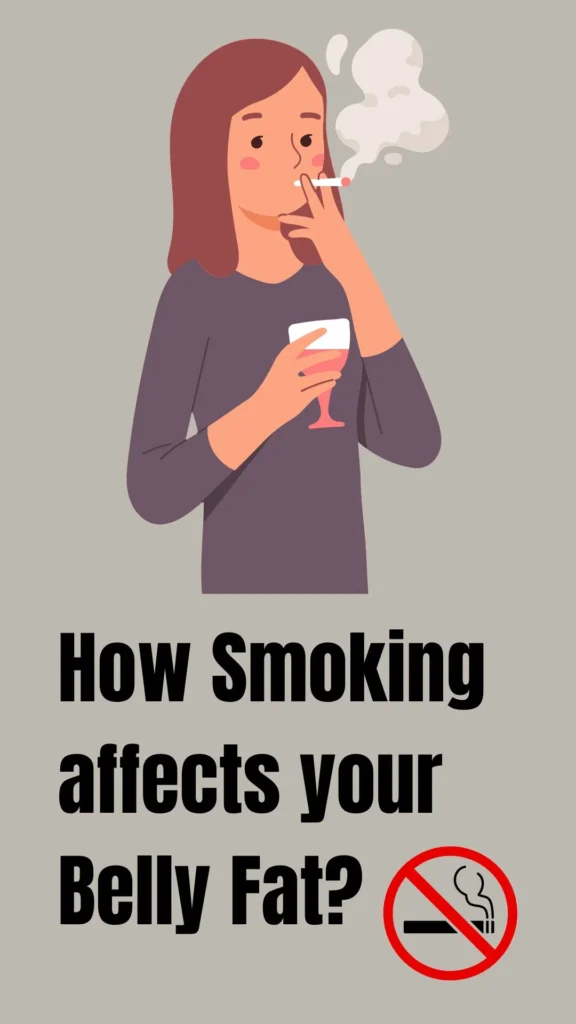
How Smoking affects your Belly Fat?
There is a long held belief that smoking helps you stay slim. Smokers themselves often report feeling less hungry after a cigarette, and the stereotypical image of a thin smoker persists. However, research paints a different picture. Smoking does not suppress appetite in a significant way, and any short term reduction in calorie intake is outweighed by the negative health consequences of smoking.

Why this belief is wrong?
Is Nicotine’s Effect:
Addictive drug in cigarettes is Nicotine, interacts with the complex hormonal system that regulates appetite. It may slightly decrease levels of ghrelin, often referred to as the “hunger hormone,” which can lead to feeling less hungry in the short term. However, this effect is inconsistent and fades quickly. It’s may also increase levels of leptin, a hormone that signals satiety or fullness to the brain. However, research suggests that nicotine’s impact on leptin is weak and unreliable. Overall, the effects of nicotine on appetite regulation are complex and appear to be minimal.
Blood Sugar Regulation:
Nicotine can also interfere with how your body processes insulin, the hormone that helps your cells absorb glucose (sugar) from the bloodstream. When you smoke, nicotine causes a temporary spike in blood sugar levels. This can provide a short lived feeling of energy. But it’s followed by a crash as insulin levels rise to compensate. These blood sugar fluctuations can leave you feeling hungrier and more likely to crave sugary or high carb snacks, which can lead to weight gain over time. Additionally, chronically high blood sugar levels can contribute to insulin resistance, a condition in which the body’s cells become less responsive to insulin. This can further disrupt blood sugar regulation and promote fat storage, especially around the abdomen.
Stress Hormones:
Smoking also increases stress hormones like cortisol. Cortisol is a hormone produced by the adrenal glands in response to stress. It plays a number of important roles in the body, including regulating blood sugar levels, blood pressure, and the immune system. However, chronically elevated cortisol levels can have negative health consequences, including increased belly fat storage. Cortisol is known to promote the storage of fat, particularly in the abdominal region. This is because cortisol stimulates the breakdown of proteins in the muscles and tissues throughout the body, and these free floating amino acids can be converted into fat by the liver. Additionally, cortisol can decrease insulin sensitivity, which can further promote fat storage.
How smoking can affect your belly fat.
Visceral fat
Smokers tend to have a lower overall body weight but more fat around their abdomen. This fat is called visceral fat, and it’s the particularly dangerous kind that accumulates deep inside your belly, surrounding your organs. Visceral fat is more metabolically active than subcutaneous fat (the fat you can pinch under your skin), meaning it releases more hormones and inflammatory substances into the bloodstream. These substances are linked to an increased risk of several chronic health conditions, including:
- Heart disease: Visceral fat is a major risk factor for heart disease, the leading cause of death for both men and women. Visceral fat contributes to heart disease by promoting inflammation throughout the body, which can damage blood vessels and arteries. It can also increase levels of triglycerides, a type of fat in the blood, and decrease levels of HDL, the “good” cholesterol.
- Stroke: Visceral fat can also increase your risk of stroke by contributing to the buildup of plaque in your arteries. This plaque can narrow your arteries and make it more likely for a clot to form blocking blood flow to the brain.
- Type 2 diabetes: Visceral fat can impair the body’s ability to use insulin, a hormone that helps regulate blood sugar levels. Over time, this can lead to type 2 diabetes.
- Some cancers: Visceral fat has also been linked to an increased risk of certain cancers, including colorectal cancer and pancreatic cancer. The exact reasons for this are not fully understood, but it is thought that the inflammatory substances released by visceral fat may play a role.
Suppress Appetite
While smoking may curb your appetite somewhat in the immediate aftermath of smoking a cigarette, the effect is small and fades quickly. This can lead to a cycle of compensatory cravings later on. When the initial appetite suppression wears off, you may find yourself hungrier than usual. This can lead to overeating, especially sugary or high carb snacks that are quick and easy to consume but provide little nutritional value. Over time, this pattern of eating can contribute to weight gain, especially around the middle.
So, if you’re looking to lose weight or improve your health, quitting smoking is a great first step. You may even find that it helps you shed some unwanted belly fat.




